- Home
- Robin Hobb
Renegade's Magic ss-3 Page 63
Renegade's Magic ss-3 Read online
Page 63
“So you’re not from around here?”
Chewing the dumpling was an exercise and swallowing it an act of will. “No. I got all turned around in the forest. It was only by luck that I struck the King’s Road. When I saw it through the trees, I thought sure there would be a work crew who could help me. But it was still as death out there. What happened?” I took another bite of the corn dodger. No. Familiarity didn’t improve it. But it felt good to have food inside me.
“King decided to pull the work crews off. He’s got more important things for them to do.” Before I could ask what, he said, “So you said you’re a trapper?”
Actually, he had said it, but the lie worked as well as any other. I filled my mouth with half a corn dodger and nodded.
“Yeah?” He looked skeptical. “What happened to all your gear, then? How’d you get lost from your trapline?”
I swallowed the greasy bread and hastily backtracked. “Well, I thought I was going to be a trapper. Thought I knew more than anyone else about it. I did a lot of trapping, back west in the Midlands. But it’s getting real settled there, and I’d always heard the best furs came out of the Barrier Mountains. So I thought I’d go take some. Everyone warned me, but, well, I thought I had to try. The fear wasn’t too bad when I went in there. You know, I thought I could take it, get some good furs when no one else could. But then the fear come down, and—well, I didn’t think I was going to stay sane, let alone live. I got all turned around, lost everything I had, and I just couldn’t find my way out.”
Now he was nodding sagely. “Oh, yes. I think we’ve all known what that feels like. But lately, it’s slacked off. For a while there, it was gone, then it come back worse than ever, and now it’s gone again. Likely that’s why you could come to your senses.” He sighed. “I still don’t trust it to stay gone. I don’t go any deeper into that forest than I have to. I get my firewood along the edge of it. But I don’t walk under the trees. No, sir.”
“I expect you’re wise. Wish I’d kept the same rules. So why did the King give up on his road?”
Kesey grinned, enjoying being the bearer of big news. “You ain’t heard nothing about doings in the Midlands?”
“Who would tell me? The trees?”
He laughed. “Big gold strike back east. And I mean big. Some fool daughter of a noble family sent the Queen a bunch of rocks, saying she thought she’d find them interesting. Well, she surely did! King claimed it all for the Crown, but that don’t stop some folks, you know what I mean. They swarmed the place. The King pulled the prison workers back from the roadwork to put them to digging for gold instead of chopping trees, and pulled most of the troops back to keep the prisoners busy at what they were supposed to do and keep other folk from doing what they aren’t supposed to do. It’s huge, my friend. Fellow told me that the newspaper says there’s a whole city sprung up near the diggings, in just a couple of weeks!” He sat back in my chair and laughed at me. “I can’t believe you ain’t heard nothing. Bet you’re the only man in Gernia who hasn’t.”
“Probably so,” I agreed. My mind was whirling. I put the last piece of corn dodger into my mouth and chewed thoughtfully, then followed it with a mouthful of the very black coffee. Gold. So that had been Professor Stiet’s game. When Dewara had dragged me home, I’d carried off an ore sample with me. Caulder had stolen it, then I’d given it to him, he had shown his uncle after his father disowned him and his uncle had adopted him, his uncle had recognized what it was, and now my little sister had started a gold rush by sending more ore samples to the Queen. I tried to sort out all the threads. Was this magic, this complicated chain of happenstance? Had that been what the magic intended all along, that I start a gold rush to drain the Gernians away from the Specks’ territory? I had a hazy remembrance of thinking that the flow of population responded more to pulling than to pushing. I hadn’t shoved Gernia away from the Speck territories. I’d pulled it back toward the Midlands by appealing to its greed. King Troven would not have hesitated. A gold mine in the hand was worth several prospective roads to a seacoast he’d never seen.
“Shock, isn’t it? Gold. You can bet that the Landsingers are singing a different tune now. I heard they want to do a lot of trade with us, and are offering some pretty favorable terms. I heard some of our nobles are saying, ‘Hold out for them returning our coastal provinces to us.” Wonder if they’ll cave that far.”
I was still trying to put it all together. “So what’s that done to Gettys?”
“Well, hard to say if it’s done us good or bad, but it’s about what you’d expect. There ain’t much of Gettys left to tell about. When word about gold got here, most all the townsfolk who could pull up and go, went. Then the orders came to bring the prisoners back as a workforce. That took the prisoners out of Gettys, and a’course their guards went with them, plus some of the regiment to escort them. My regiment was already at low strength from disease, death, and desertion. But now we aren’t even a regiment. The commander and most of the high-ranking officers packed up and went west when their orders come through. Only two companies left here now, just a token force to keep the place from falling down, and our highest-ranked officer is a captain. It’s like they went off and forgot some of us here. Told us to ‘hold the fort.’ Didn’t tell us how.”
“So…” I said, and wondered what to ask next. Would Spink and Epiny and Amzil and the children have gone west with the others? “But you’re still here?”
“Guess I been soldiering too long.” He took a bite of the corn dodger in his hand. With a finger, he poked it to the back of his mouth before chewing it, and I recalled that he’d always had problems with his teeth. He made noises as he ate now, trying to move the food around to where he had teeth to chew it. When he spoke, his words were muffled with food. “Obeying orders went past being a habit with me a long time ago. It’s in my bones now. Me and most of the old dogs, we stayed. Sit. Stay. Guard. That’s us. Played havoc with our chain of command when so many officers went back west. There’s some kind of new law, some priest thing back west about nobles and their sons. Evidently a lot of them noblemen lost their eldest sons in that plague bout they had, and they didn’t like it too much. Some of our officers that were born soldier sons heard they might get jumped up to heirs if some new rule gets approved. Sounds unnatural to me. A man should be what he’s born to be and not complain. But it’s going to mean a lot of changes if men that were supposed to be officers suddenly have to go back west and be their fathers’ heirs. ’Course, there’s a few we wish would leave! That fellow in charge now, I don’t think he could lead a troop of new recruits into a whorehouse, if we still had a whorehouse, but we’re stuck with him. Captain Thayer isn’t what you’d call beloved by his troops. But we’ll still obey old stick-up-his-arse, because he’s got the shiny bits on his uniform that says we should.”
“Captain Thayer’s the commander now?” Nausea roiled through me.
“You know Thayer?”
“No, no. I meant, Captain Thayer is running the whole regiment?”
“Well, I told you, the most of the regiment left. Only a couple of companies left now. And they didn’t have much choice as to who to leave in charge. He was ranker than most, as the saying goes, so he got it. They’ll probably jump him up in rank to make it appropriate when they get around to it. I just hope that when they do, he doesn’t think that means he has to get even more straitlaced than he is now.”
“Pretty narrow-minded, is he?” He was the same old Kesey as ever. It only took a few words of encouragement to keep him talking.
He filled his cup again with a mixture of black coffee and grounds. “You don’t know the half of it,” he grumbled. “Goes on about the good god every time he talks to us. Ran the whores out of town; sent them off when the prisoners left. No one could figure that out. They were all honest whores, for the most part. But Captain Thayer says now that women are most often a man’s downfall. Had a man flogged for sneaking round to see another soldier’s wife, and told th
e first soldier he should have kep’ his wife at home and busy so she didn’t put wrong thoughts in a man’s head. Wife and hubby both spent a cozy day in the stocks.”
“The stocks? I didn’t even know we had stocks! That’s harsh! Sounds like he’s wound pretty tight.” I was puzzled. That didn’t seem like the sort of man who would have wooed and won Carsina.
“Oh, he’s a big one fer telling us all about our sins and how they brought misfortune down on all of us. And he says that public shame is the best remedy for private sins. So we got stocks now, and a flogging post, near the old gallows. He hasn’t used them that much—hasn’t had to. Makes a man’s blood run cold just to walk by them. Captain says lust and whores and women of bad repute are the worst things that can befall a soldier, and he intends to keep us all safe. Well, I’ll tell you, we’d all like to be a bit less safe.”
“I imagine so,” I said quietly. I wondered how Epiny liked Captain Thayer as a commander. The streets of the fort might be a bit safer for the women of Gettys, but I suspected his ideas of keeping women busy at home weren’t too popular with her. I tried not to grin at the thought. Epiny had not escaped from being under my aunt’s thumb to knuckling to her husband’s commander, I’d wager.
I suddenly knew that I had to see her and Spink today, and that the risks of doing so didn’t matter. I was instantly ready to go, and then I thought of Amzil, and felt an icicle of indecision up my spine. I cared for her. Why did that make me more reluctant to go and see her? I glanced down at myself and realized the obvious answer. “I need to get some proper clothing,” I said to myself, and then realized I’d spoken aloud.
“That’s very true,” Kesey agreed with a grin. “If it weren’t for the way you’re dressed, I’d a never believed your story. I would have thought you were a deserter, maybe; you got a soldier’s way of walking and sitting.”
“Me?” I made a show of laughing to hide the little burst of pride I felt. “No. Not me. But I knew a family in the fort…well, I didn’t exactly know them. My cousin knew them and said that if I got out this way, I should look them up. But I don’t suppose I should show up on their doorstep looking like this.”
“No, I don’t think so,” Kesey agreed with a grin. He’d always been a good-hearted fellow. I was counting on that now, and he didn’t fail me. “I don’t think anything I got here would fit you much better than what you got on. But if you want, I could take a note to your cousin’s friends, and maybe they could see their way clear to help you out.”
“I would be forever in your debt,” I replied fervently.
When Kesey heard that Lieutenant Kester was my cousin’s friend, he nodded affably and said, “He’s one of the few officers we have that acts like an officer anymore. Why, he had a private supply wagon that come in way ahead of the military ones, and you know what he done? Shared it all, even though it didn’t go far, and him with a house full of children, his own child and the Dead Town whore’s brats.”
It cut me still to hear Amzil called that name, and it was all I could do to hold my tongue.
“Have you paper and a pen I could use?” I asked him a bit curtly, and he looked hurt for an instant before admitting that he wasn’t much of a reader or a writer, so had nothing like that. After a bit of a search, he reluctantly came up with one of my old newspapers. “Belonged to a friend of mine. I’m not much for reading, but I’ve sort of been saving it.”
I persuaded him to give me one sheet of it, and scratched out a crude message over the print with the burnt end of a stick. There was little room to be elegant or subtle. I printed out, “I’m back, alive. I need clothes. Follow Kesey, and I’ll explain all later.”
I signed it N.B. and entrusted it to Kesey, then watched him ride away on his broom-tailed horse.
After he was out of sight, I found myself at a loss for what to do with myself. I took a brief stroll through the cemetery that I had tended so faithfully. There was a new trench grave there, so recent that the grass hadn’t covered it yet. I frowned at that, for plague outbreaks usually happened in the heat of summer. Then I saw that there was actually a marker, copied from the ones I had made, made of wood with the letters burned into it. Here were buried the victims of the massacre I’d led but a few months ago. The ground would have been too hard and frozen to permit grave-digging at the time they’d died. It gave me a sharp pang to think of the bodies stored frozen in the shed until spring had softened the ground enough to bury them. Doubtless that had been a horrid task for whoever had had to perform it. Probably Kesey and Ebrooks, I realized. I turned abruptly away from the grave of the men, women, and children I had killed and started back toward my cabin.
Curiosity made me pause and look back to where my hedge of kaembra trees had once stood. Fool that I’d been, I’d hoped to keep the Specks out of the graveyard with a barrier of trees and stone. The trees had been cut down and the sections of trunk buried along with the plague victims they’d ensnared, but I saw that the stumps had sprouted again from the roots. I tried to decide what I felt about that sight, but could not. I recalled only too well my disgust as the trees had sent their roots questing into the plague bodies, but now that I understood more fully what it was to have a tree, I felt sad that they had been cut down and the bodies buried. Would it have been so bad for those people, I wondered, to live on as trees? Could they have spoken to us as the other kaembra trees spoke to the Specks? I shook my head at myself and turned back to the cabin. That world was not mine anymore. The forest would never speak to me again.
I sat briefly in my chair, staring at Kesey’s dying fire, and then could not stand the squalor anymore. I went to the spring for a bucket of water and set it to heat. I told myself that when Kesey returned, I’d tell him that I had done it as a repayment for the good deeds he’d done for me. But the honest truth was that it pained me to see that my formerly tidy little residence had become such a sty.
So I scraped and washed the dishes and pots, and then swept a substantial heap of mud and dirt out of the door. In the process of putting the dishes back in the cupboard, I came across what remained of my possessions. Kesey had kept everything that I’d left there. My clothing had been carefully folded. Even my worn-out shoes were there. I shook out one of the shirts and then put it on. It hung loose all around me, and for a moment I marveled that it had ever fit me. I wondered why Kesey had not offered me the use of these clothes, and then was oddly touched that he had not. I refolded the shirt and restored it to its place. He’d kept my things, I realized, as a sort of remembrance of me.
Trying to change clothes had shown me how dirty I was. I heated water, washed, and even shaved using Kesey’s razor. Looking into his mirror was a revelation. I was pale as a mushroom, and the skin on my face was overly sensitive. I nicked myself twice and bled profusely both times. But the real shock was the shape of my face. I had cheekbones and a defined chin. My eyes had emerged from the pillows of fat that had narrowed them. I looked like Cadet Nevare Burvelle. I looked like Carsina’s fiancé. I touched my face with my hand. I looked like my father and Rosse, I realized. But mostly like my father.
Restlessness made me leave the cabin. I felt I could not sit still and wait. I put my rags back on and went out to Kesey’s woodpile. I chopped some kindling for him, until the uncallused skin on my hands protested this rough usage. I put what I had chopped in a tidy stack by his door and wondered how much time had passed. Would he ever return? Would Spink come with him right away or would he think it some sort of bizarre prank? The minutes of the day dripped by slowly.
I paced. I walked out to my old vegetable garden to find it a patch of weeds. Nothing useful there. Using the rusty sabre hilt with its bit of blade and one of the table knives, I successfully repaired the shutter so that it hung straight again. I paced some more. My old sabre still hung on the wall of the cabin. I took it down, hefted it, and tried a few lunges. It still wasn’t much of a weapon. It was notched and rust had eaten at it. But it was still a sword. At first it felt foreign in my
hand, but after a few feints and then a solid touch on the door it felt like the grip of an old friend’s hand. I grinned foolishly.
After what felt like several days, I heard the sounds of someone approaching. But it wasn’t a lone horse, or even two horses. It sounded like a cart. I hastily put the sword back where it had been and walked to where I could look down the track that wound up the hill.
Kesey was riding his horse. Behind him, drawn by an old nag, Epiny was driving the most ramshackle two-wheeled cart I’d ever seen. Moreover, she was driving it one-handed. On the seat next to her was a large basket and her other hand rested inside it. In the basket, a baby was kicking and fussing.
CHAPTER THIRTY
REUNION
The world stood breathless around me as that cart slowly came up the hill. I had time to absorb every detail. Epiny wore a proper hat, but it had been donned hastily, unless it was the fashion now to wear it nearly sliding off one side of her head. Her hair had come unbundled and half spilled down her back. One of the wheels on the cart was wobbling so badly that I immediately resolved she could not go back to Gettys in that conveyance until we had secured it. But mostly I just stared at Epiny’s face.
As she drew nearer, I could see high spots of bright color on her cheeks. She was thin, but not as thin as the last time I’d glimpsed her in my dream. I could see her mouth moving as she spoke to the baby in her basket, and then suddenly I couldn’t stand it any longer. I began to run down the hill toward her shouting, “Epiny! Epiny!”

 Ship of Destiny
Ship of Destiny Golden Fool
Golden Fool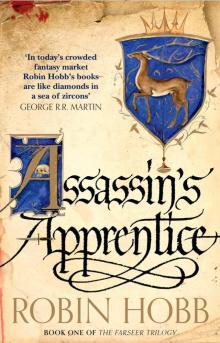 Assassins Apprentice
Assassins Apprentice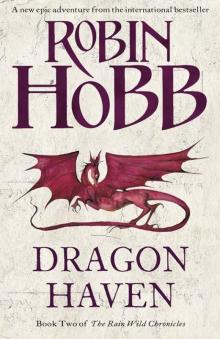 The Dragon Keeper
The Dragon Keeper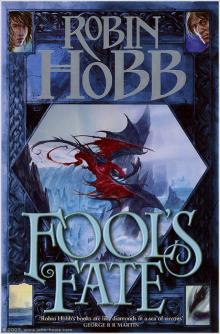 Fools Fate
Fools Fate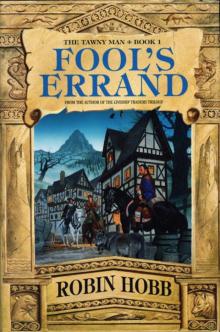 Fools Errand
Fools Errand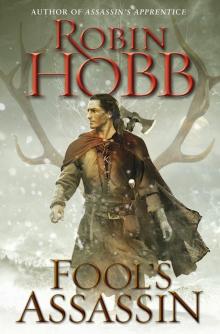 Fools Assassin
Fools Assassin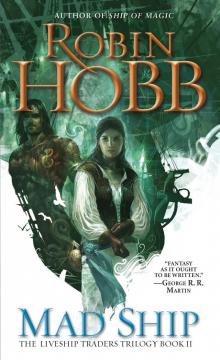 The Mad Ship
The Mad Ship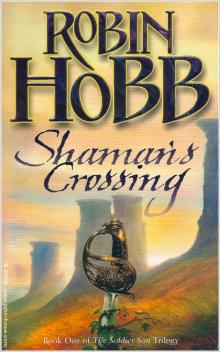 Shamans Crossing
Shamans Crossing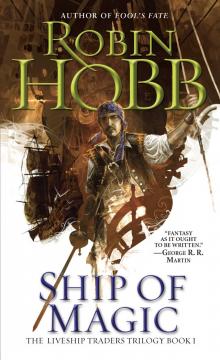 Ship of Magic
Ship of Magic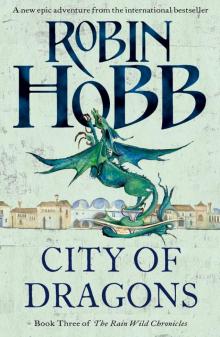 City of Dragons
City of Dragons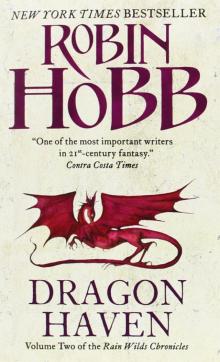 Dragon Haven
Dragon Haven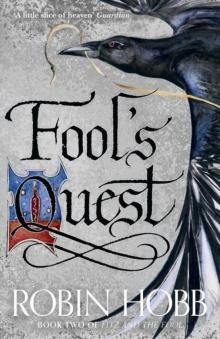 Fools Quest
Fools Quest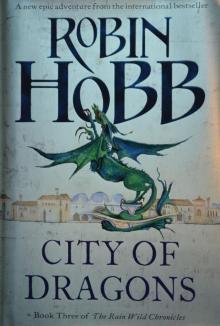 Blood of Dragons
Blood of Dragons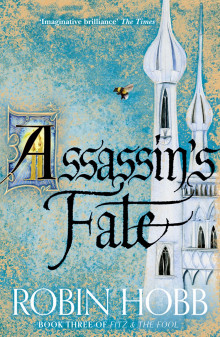 Assassin's Fate
Assassin's Fate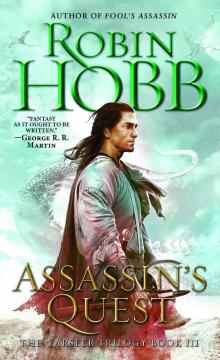 Assassins Quest
Assassins Quest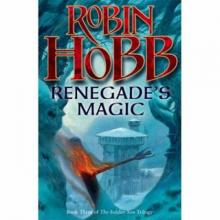 Renegades Magic
Renegades Magic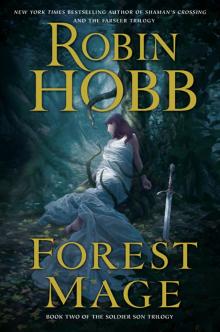 Forest Mage
Forest Mage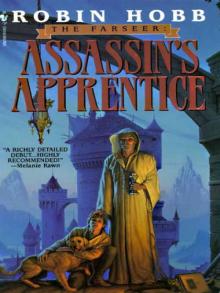 Assassin's Apprentice tft-1
Assassin's Apprentice tft-1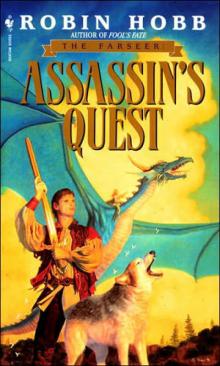 Assassin's Quest tft-3
Assassin's Quest tft-3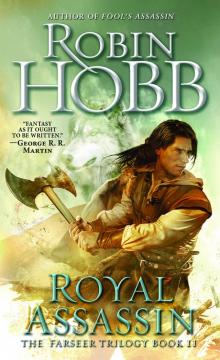 Royal Assassin
Royal Assassin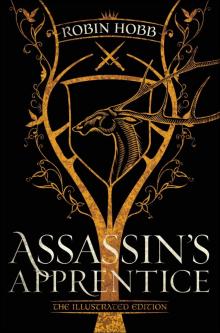 Assassin's Apprentice (The Illustrated Edition)
Assassin's Apprentice (The Illustrated Edition) Assassin's Quest (UK)
Assassin's Quest (UK) Royal Assassin (UK)
Royal Assassin (UK)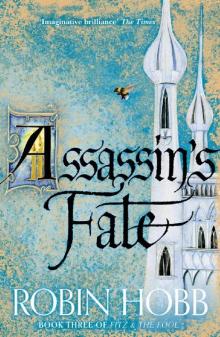 FF3 Assassin’s Fate
FF3 Assassin’s Fate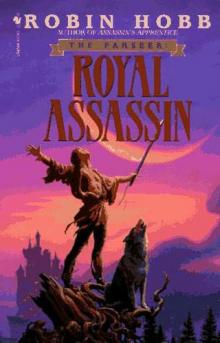 Royal Assassin tft-2
Royal Assassin tft-2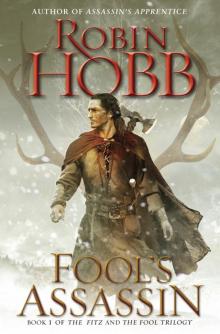 Fool’s Assassin: Book One of the Fitz and the Fool Trilogy
Fool’s Assassin: Book One of the Fitz and the Fool Trilogy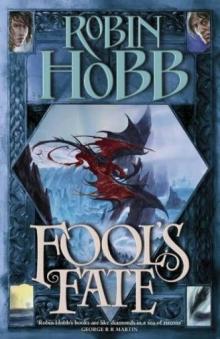 Fool's Fate ttm-3
Fool's Fate ttm-3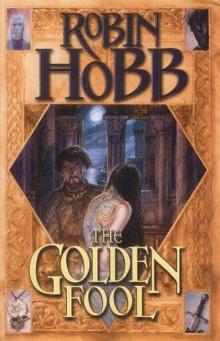 The Golden Fool ttm-2
The Golden Fool ttm-2 The Liveship Traders Series
The Liveship Traders Series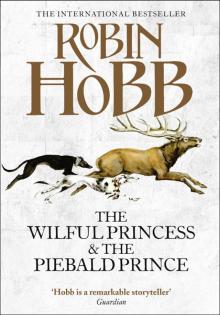 The Wilful Princess and the Piebald Prince
The Wilful Princess and the Piebald Prince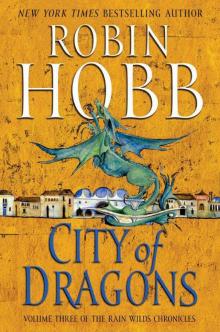 City of Dragons rwc-3
City of Dragons rwc-3 The Tawny Man 1 - Fool's Errand
The Tawny Man 1 - Fool's Errand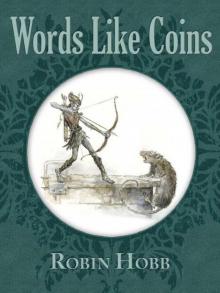 Words Like Coins
Words Like Coins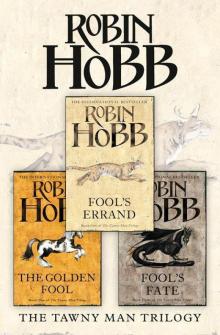 The Complete Tawny Man Trilogy Omnibus
The Complete Tawny Man Trilogy Omnibus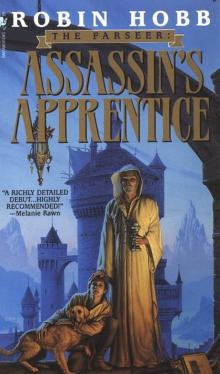 Farseer 1 - Assassin's Apprentice
Farseer 1 - Assassin's Apprentice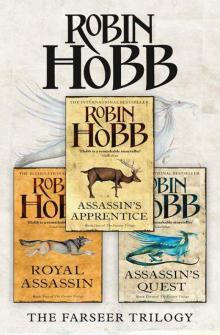 The Complete Farseer Trilogy Omnibus
The Complete Farseer Trilogy Omnibus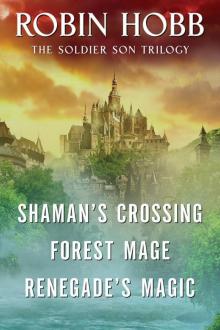 The Soldier Son Trilogy Bundle
The Soldier Son Trilogy Bundle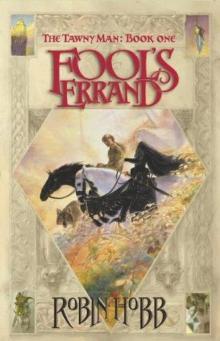 Fool's Errand ttm-1
Fool's Errand ttm-1 Blue Boots
Blue Boots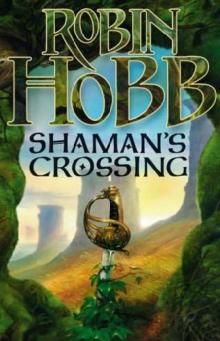 Shaman's Crossing ss-1
Shaman's Crossing ss-1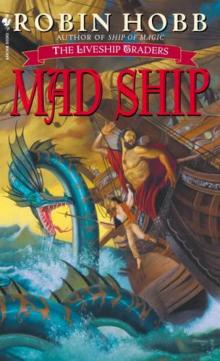 Mad Ship
Mad Ship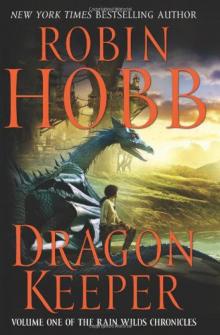 Dragon Keeper
Dragon Keeper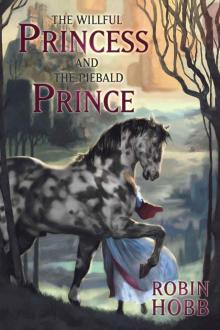 The Willful Princess and the Piebald Prince
The Willful Princess and the Piebald Prince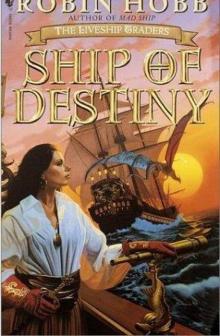 Ship of Destiny tlt-3
Ship of Destiny tlt-3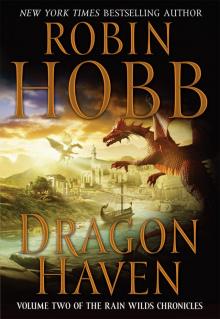 Rain Wild Chronicles 02 - Dragon Haven
Rain Wild Chronicles 02 - Dragon Haven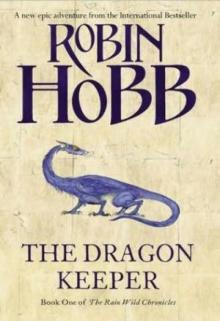 The Dragon Keeper trwc-1
The Dragon Keeper trwc-1 The Triumph
The Triumph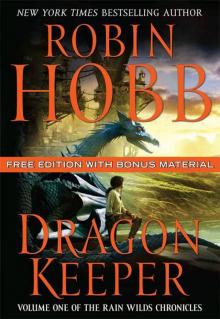 Dragon Keeper Free Edition with Bonus Material
Dragon Keeper Free Edition with Bonus Material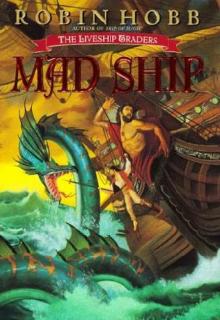 Mad Ship tlt-2
Mad Ship tlt-2 The Inheritance and Other Stories
The Inheritance and Other Stories Tawny Man 02 - Golden Fool
Tawny Man 02 - Golden Fool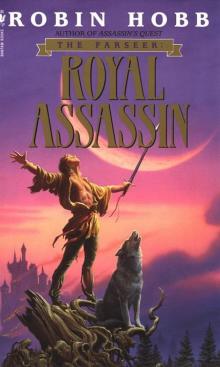 Farseer 2 - Royal Assassin
Farseer 2 - Royal Assassin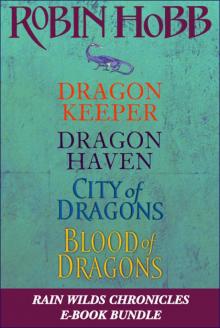 Rain Wilds Chronicles
Rain Wilds Chronicles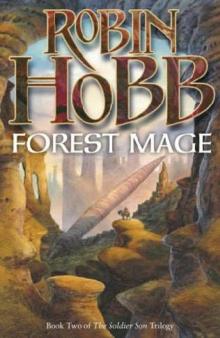 Forest Mage ss-2
Forest Mage ss-2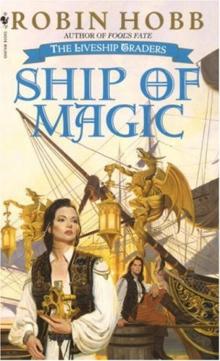 Ship of Magic lt-1
Ship of Magic lt-1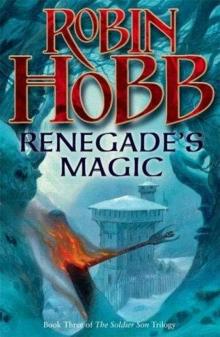 Renegade's Magic ss-3
Renegade's Magic ss-3